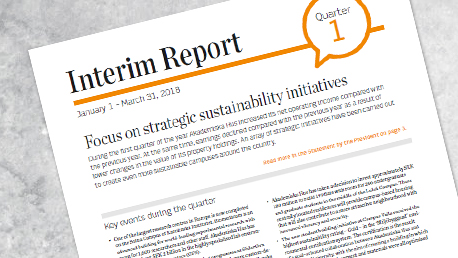Akademiska Hus Interim Report 1 January – 31 March 2018
Friday, 27 April 2018
During the first quarter Akademiska Hus increases its net operating income compared with the previous year. At the same time, earnings for the period declined because of lower changes in the value of its property holdings. An array of strategic initiatives have been carried out to create even more sustainable campuses around the country.
The Interim Report in brief:
- Rental revenue was SEK 1,489 million (1,409).
- Net operating income totalled SEK 1,037 million (993), an increase of SEK 44 million.
- Changes in property values with an impact on profit totalled SEK 263 million (902), corresponding with a 0.3 per cent (1.2) increase in the value of the properties.
- The total financing cost was SEK –266 million (–141), of which SEK –207 million (–80) relates to changes in the value of financial instruments.
- Profit before tax amounted to SEK 1,017 million (1,737) and profit for the period was SEK 784 million (1,346).
- Investment in redevelopment and new construction totalled SEK 679 million (848).
- The yield (excluding properties under construction) was 5.3 per cent (5.6) over the past 12 months.
During the first quarter of the year Akademiska Hus focused on an array of exciting projects that will strengthen operations at Swedish centres of education. Gothenburg University’s development plan for the area around Näckrosdammen in central Gothenburg was presented in March.The location offers a unique setting to create a park for the humanities, art and culture. In Luleå Akademiska Hus is investing approximately SEK 180 million to build about 270 undergraduate and graduate student housing units in the middle of the campus. In addition to increasing the supply of housing to meet demand, the campus will become more vibrant just about around the clock.
Akademiska Hus has also focused on strategic sustainability initiatives, like the decision to engage in a record-breaking renewable energy initiative to boost its solar panel capacity by 50 per cent.
“Rooftop solar panels are now being installed on the majority of buildings on the Ultuna Campus in Uppsala. As a result, total solar energy production for our entire holdings around the country will rise from 2 to 3 million kWh/year”, says Kerstin Lindberg Göransson, President of Akademiska Hus.
Akademiska Hus is working with several local parties in Umeå to develop the University City neighbourhood within the framework of the RUGGEDISED Smart City project. The aim is to discover and test energy solutions for the future. In March an international project meeting was held for IRIS Smart Cities, one of several EU initiatives in which Akademiska Hus is involved. The Johanneberg Campus at Chalmers is the demonstration and test bed district within IRIS Smart Cities. Akademiska Hus is also participating in a number of other collaborative projects on the Johanneberg Campus, such as EU’s FED (Fossil-free Energy Districts) project.
The Valla Student Building has already been environmentally certified in compliance with the ‘Miljöbyggnad’ Gold standard. Akademiska Hus and Linköping University have shared this aspiration ever since they started planning the project for a student building that is truly on the cutting edge in terms of sustainability.